ACT / SRO / Community Policing
Norton Police Department
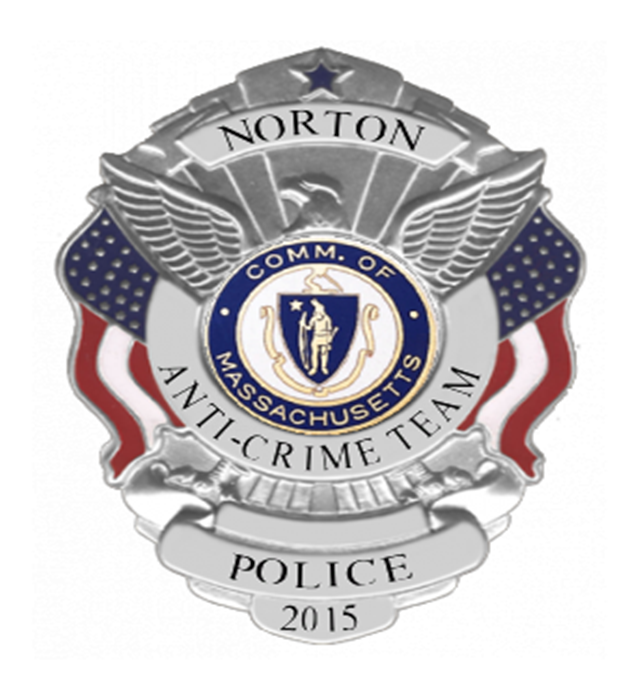
Problem Oriented Policing Anti-Crime Team
(POP ACT)
2023
This reporting period covers January 1, 2023 thru December 31, 2023.

Overview
In May of 2015, the police department unveiled a Problem Oriented Policing Anti-Crime Team. This team came under the direction of the Detective Division. The team targets various types of repeats calls for service in order to come up with non-traditional solutions for these quality-of-life incidents and provide necessary resources to those in need. The team relentlessly conducts proactive follow ups on many areas of community concern. The team has expanded to several officers being assigned on a part time rotating basis. This allows for more knowledge of community issues and better communicative response. The Anti-Crime Team primarily serves as a support unit to the Patrol Division and Detective Division, and works with the School Resource Officer when needed. The Anti-Crime Team is an added resource for those units in need of additional manpower. Detective Sergeant Jesse Winters oversees this project with Detective Nick Precourt being the team leader.
The Anti-Crime Team also works with outside agencies such as neighboring POP teams, probation, parole and others. The Team not only works closely with Law Enforcement agencies but also communicates and collaborates with the community and neighborhood groups. The Anti-Crime Team is an added resource for both the department and the community at large.
Problem-oriented policing (POP) was coined by University of Wisconsin–Madison professor Herman Goldstein. POP is a policing strategy that involves the identification and analysis of specific crime and disorder problems within the community. After these problems are identified, officers can develop effective and nontraditional response strategies.
1. Norton Police Co-Responder Model
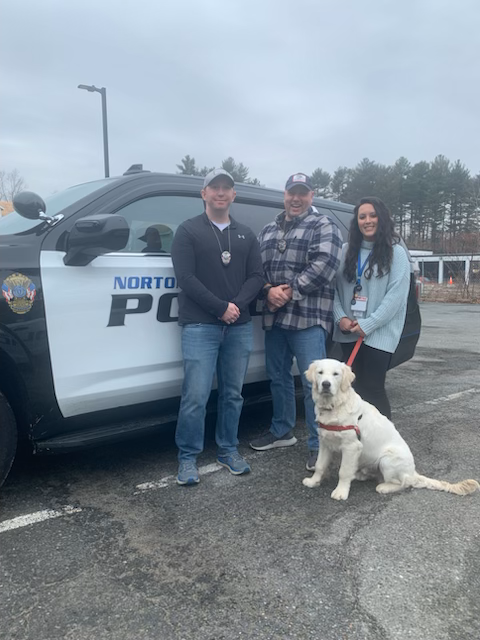
Pictured Ptlm. Kennedy, Ptlm. McCarthy, Cori and Ryder
In 2017, in an effort to provide more services and resources to the residents of Norton, the Norton Police Department partnered with the Community Counseling of Bristol County (CCBC), as they recently acquired the state contract and have a crisis center in Norton.
Since March 10, 2021 we began a formal co-responder jail diversion program. In 2022 we signed on to a Department of Public Health grant with the Raynham Police Department and received funding. The grant allows for three (3) part time mental health licensed clinician to work riding along to calls, as well as more availability to services and resources.
The team has continued to make home visits with a representative of CCBC to individuals suffering with mental health issues and/or substance abuse dependency. We also had the Director of the Norton/Brockton location in for roll call training for officers about Section 12’s and the services they provide. This program provides residents with direct contact to the crisis center located at 108 West Main Street in Norton. We have also received training from CCBC on information related to Chapter 123 Section 12 which allows for officers to implement an emergency restraint and hospitalization of persons posing risk of serious harm by reason of mental illness, dealing with individuals with trauma and post traumatic stress as well as officer wellness.
Since this program started, there has been roughly 716 follow ups where fifty eight (58) Section 12 have been completed and fifteen (15) arrests have been made.
In 2023, There were 258 follow ups alone with twenty two (22) sections 12’s and three (3) related arrests. This collaboration, communication, and increased knowledge has successfully diverted people from emergency hospital visits and the criminal justice system.
Co-Responder case sample and services
In 2023, Norton Police started receiving a number of calls for reports that a 28 year old subject in town was demonstrating bizarre behavior. This included walking around wrapped in aluminum foil, wearing an American flag as a cape, etc. The subject was approaching neighbors' homes with unclear intent. POP along with the department clinician met with the individual and family several times to try to offer support within the community, but the individual was reluctant to engage. When things escalated, the department was able to section the person for further mental health treatment. After they received treatment in July of 2023, there have been no further calls for service at their residence.
The POP team and clinician also helped divert a young mother of two from an unnecessary emergency room visit when a 3rd party called in falsely reporting she was a danger to herself and her children. The department clinician and POP officers spent time on scene verifying the safety of all parties, gathering insight from collateral contacts, and creating a rigid safety plan that ensured the individual had frequent contact with CCBC's mobile crisis team for the week following the call. The department clinician was able to connect the individual with outpatient resources and she is doing very well at this time.
In 2023, community resources also started to contact department clinicians directly when they do not specifically require a police response. The school district, Norton Housing Authority, and Norton Senior Center/Counsel on Aging have all independently sought guidance from the department clinician when concerned for an individual in their programs.
The department clinician has also been trained through the Norton District on the C-STAG Threat Assessment Model along with Norton Police SROs. This training assembles a group of trained administrative/clinical staff and law enforcement officers to discuss cases wherein youth threaten violence within the school system. The clinician's role is to assess for risk when an individual is deemed a "threat" and follow up until services are rendered. This response helps catch individuals who could pose a threat before there has been an act of violence and implement supports that could mitigate the level of risk to the community.
2.Substance Abuse/Opiate Addiction Overview
We are seeing a decrease over the past few years in overdose related calls for service. The POP team is continuing to address the opiate addiction. Opiate addiction not only has an impact on crime, but also is often fatal. Since the inception of the Problem Oriented Policing Anti-Crime Team, officers have collaborated with numerous treatment facilities helping those addicted to opiates get treatment. This has been very well received by the community and those in need of assistance. The police department recognizes that we will not arrest our way out of this problem.
During this reporting period, the Anti-Crime Team has continued contact with over fifty individuals struggling with opiate addiction. Some of these contacts have resulted in individuals seeking voluntary treatment through addiction specialists that were provided by the police department. We also frequently encourage families to pursue mandatory treatment by a process through the Attleboro District Court. When or if the family is not willing or able to do so, we can step in and petition the court ourselves. This process is called a “Section 35”. Massachusetts General Law Chapter 123 Section 35 permits the court to involuntarily commit someone whose drug or alcohol use puts themselves and others at risk. Such a commitment can lead to an in-patient substance abuse period of up to 90 days, but averages around 24 days. Some of our contacts are still struggling everyday battling their addiction. We continue to follow up with these individuals who continue to seek a sober lifestyle.
The Anti-Crime Team also does constant non-fatal overdose follow up with anyone that overdoses in the Town of Norton. During these follow ups, the team provides both the victim of the overdose and family with valuable information to assist in getting the victim help. With the idea of third-party policing, we encourage concerned family members to assist us in assisting the victim in getting treatment for their addiction.
We have also continued relationships with substance abuse counselors and counseling centers. In the past, we have taken individuals as far north as Tewksbury and Quincy for the necessary treatment. We have also participated in assisting individuals with going out of state for treatment as far as Florida. With these partnerships, we have been able to provide multiple options for individuals who are seeking treatment.
Town of Norton Previous Annual Data:
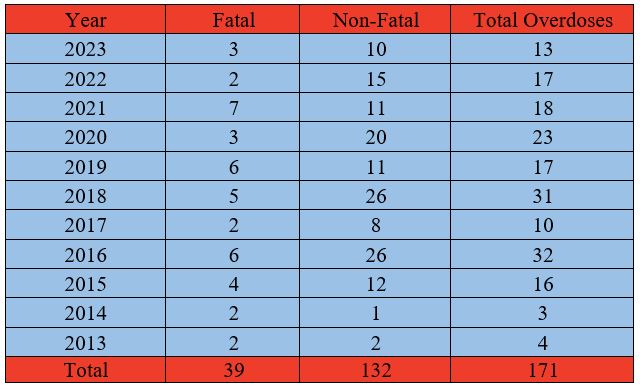
Norton Opioid Prevention and Education Collaborative (N.O.P.E.)
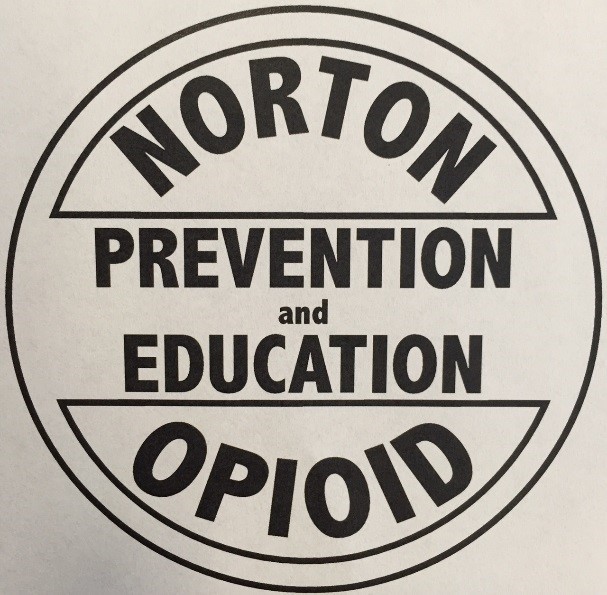
“The mission of the Norton Opioid Prevention and Education collaborative is to utilize a multidisciplinary approach with community members and leaders to strategically plan for prevention, awareness and education programs to end opioid abuse within the community.”
During February 2016, the Norton Police Department started developing the Norton Opioid Prevention and Education Collaborative, now referred to as NOPE. This collaborative was created to help combat the ongoing opiate epidemic and involves members from the police department, fire department, veteran’s office, town managers office, substance abuse professionals, the school department, health department and members of the community. The group met for the first time on April 5, 2016 and has met continuously since. COVID 19 limited our ability to have in person meeting and presentations. We are working towards new speakers in 2023 including Corey’s Cause and Hidden in Plain Sight.
Community Crisis Intervention Team (CCIT)
The Community Crisis Intervention Team (CCIT) is a unique Jail Diversion Program established in 2001 by the City of Taunton Massachusetts Police Department and other concerned community participants. CCIT is not a traditional jail diversion program, where training for law enforcement focuses on pre-arrest diversion. Instead, CCIT incorporates a community response that also diverts people with disabilities at a number of junctures. The Norton Police Department continues to send officers on an annual basis to the CCIT Training.
At this training we learned new methods and ways to deal with members of the community dealing with crisis. A portion of the training involved a panel discussion of specific cases related to communities attending the training. We have had continued conversations and meetings with CCIT members. The Norton Police Department has also sent a number of officers through this training in 2020 and continued to provide as much assistance as possible with individuals suffering from mental health issues. We continue to send officers to this training annually.
Drug Take Back
Through the Department of Environmental Protection, and in partnership with Covanta, DEA, and CVS, the Anti-Crime Team facilitated the installation of a prescription drug take back bin in the front lobby of the Police Department.
We have also participated in the DEA drug take back day in spring and fall of 2022. During the week of the DEA drug take back, we have set up appointments for both 120 West Main Street and the Senior Center to take back medication from individuals who are unable to drop medication off at the police station. This has been a successful program and we have received positive feedback from residents who were appreciative of our efforts to combat prescription drug abuse.
Since its inception in February 2016, there have been thousands of pounds that have been dropped off at the police station
3. Repeat Calls For Service Response
As mentioned in the introduction, POP is a policing strategy that involves the identification and analysis of specific crime and disorder problems within the community. After these problems are identified, officers can develop effective and nontraditional response strategies. When repeat calls for service are seen or problems arise, the POP team is tasked with follow up to assist with resources that diminish the calls and address the underlying issues.
Norton Glen Apartments
The team continued our partnership with the Norton Glen Management. We continued the process of eviction for individuals who were causing disturbances within that community. There were also several other individuals who were trespassed from the property that were causing problems.
We also participated in annual community events at the Norton Glen. We held an ice cream social as well as participated in a toy drive and turkey distribution during the holiday season. We have plans to continue attending these events and building strong community ties with residents.
Norton Housing
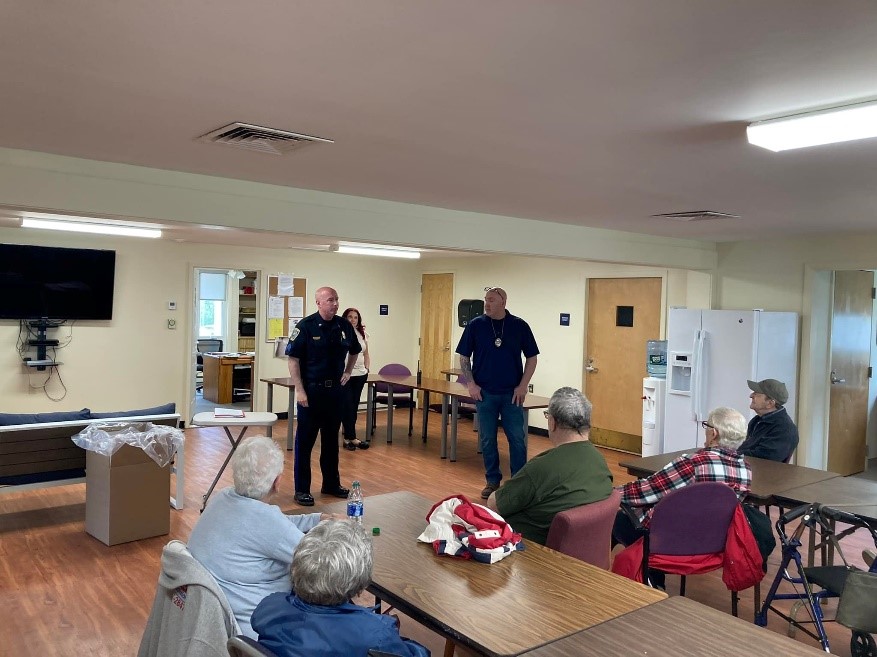
The Norton Housing Authority manages two major residential properties in the Town of Norton with one hundred and forty-four housing units. The elderly and handicap development is located at 120 West Main Street and the family development is Jacob’s Way located off of Newcomb Street. The Anti-Crime Team has built a strong relationship with management to ensure safety and security in both of these communities.
With a previous memorandum of understanding (MOU) with Norton Housing and the Norton Police, the Anti-Crime Team assists Norton Housing with potential new residents. By assisting with this, it assists management with getting the best quality candidate for that community. We also continue to assist with additional security proposals, including but not limited to updating firearm policies and an updated security surveillance system.
Extended Stay Hotel
The Extended Stay hotel located at 280 South Washington St. has a high call volume for police related incidents. The incidents include overdoses, thefts, drug related crime, warrant arrests, mental health and well-being checks. This past year saw a influx of emergency migrant housing to this location. We worked with human services and National Guard to assist as needed. Because this location has been historically seen high call volume, we work collaboratively with management to assist with resources when issues arise.
Bristol County House of Corrections
The Anti-Crime Team established a program with the Bristol County Sheriff’s Office in 2015 and continue to get weekly updates of any persons incarcerated in the Bristol County House of Corrections that have a residential address in Norton or are incarcerated for crimes that were committed in Norton. This program is beneficial to both the Norton Police as well as the residents of Norton. We are now able to monitor these individuals while they are incarcerated and we know their release dates. This has given us the ability to go visit these incarcerated individuals just prior to their release. During our visits, we offer the individual assistance in drug or alcohol treatment, domestic violence counseling and other services that could be beneficial to their release. We have found that there is a mostly positive response from the incarcerated person that the police are going to speak with them. This has proven to be successful for future encounters on the street after release.
Drug & Criminal Investigations
The POP team leader and supervisor are currently assigned to the detective division. There have been numerous drug and criminal investigations that have occurred within the detective division that have involved the POP Team. These include but are not limited to illegal narcotics investigations.
Probation
The Anti-Crime Team continues to work with the Attleboro District Court Probation Department with individuals who are currently on probation. The team routinely checks on these individuals and has constant communication with the probation department. The team has also gone on home visits of individuals on probation and assisted probation department during FY 2020.
2024 Goals
Looking to the future, the Anti-Crime Team would continue to provide outreach to those community members suffering from addiction and mental health as well as to continue to provide services for their families. We wish to continue to receive grant funding and increase the hours of our clinician. This has been a well-received, helpful and needed addition to the department and the community. This resource provides direct contract for individuals suffering from mental health for twenty-four-hour services in the Town of Norton.

